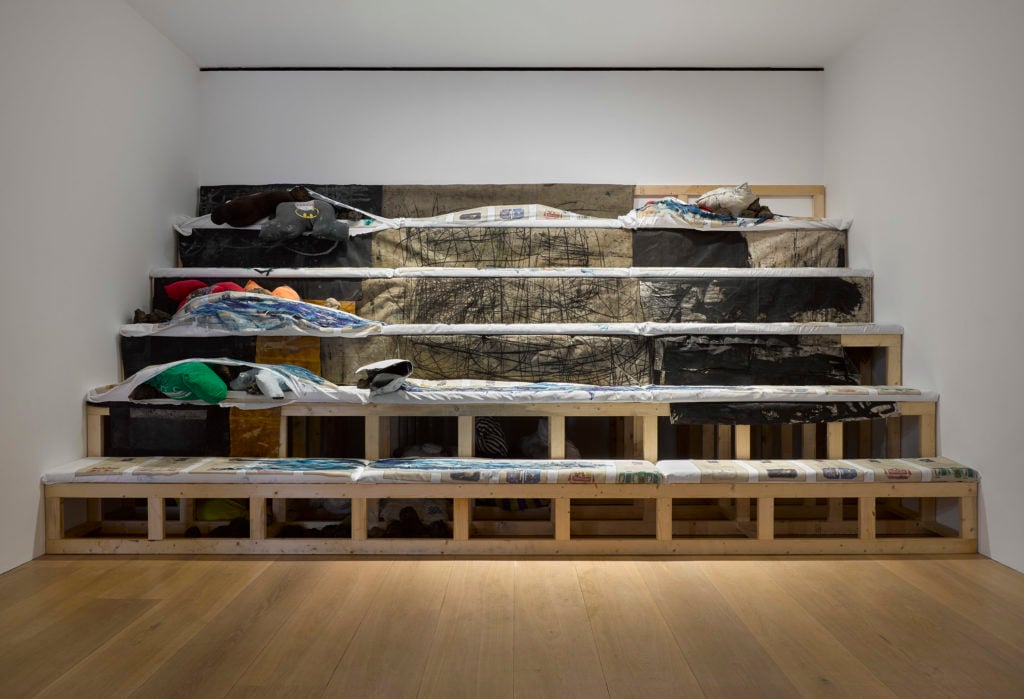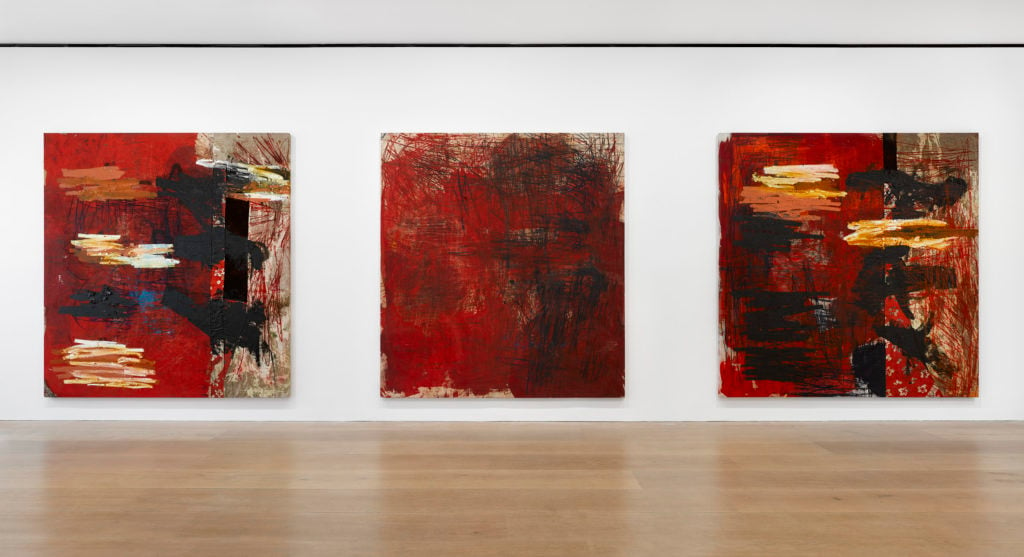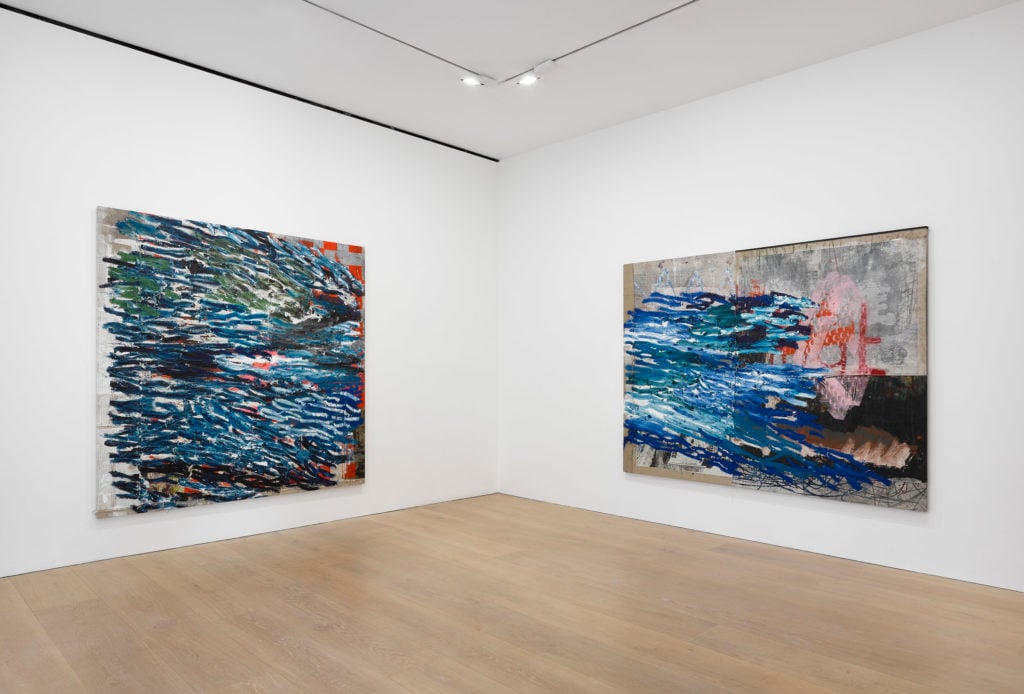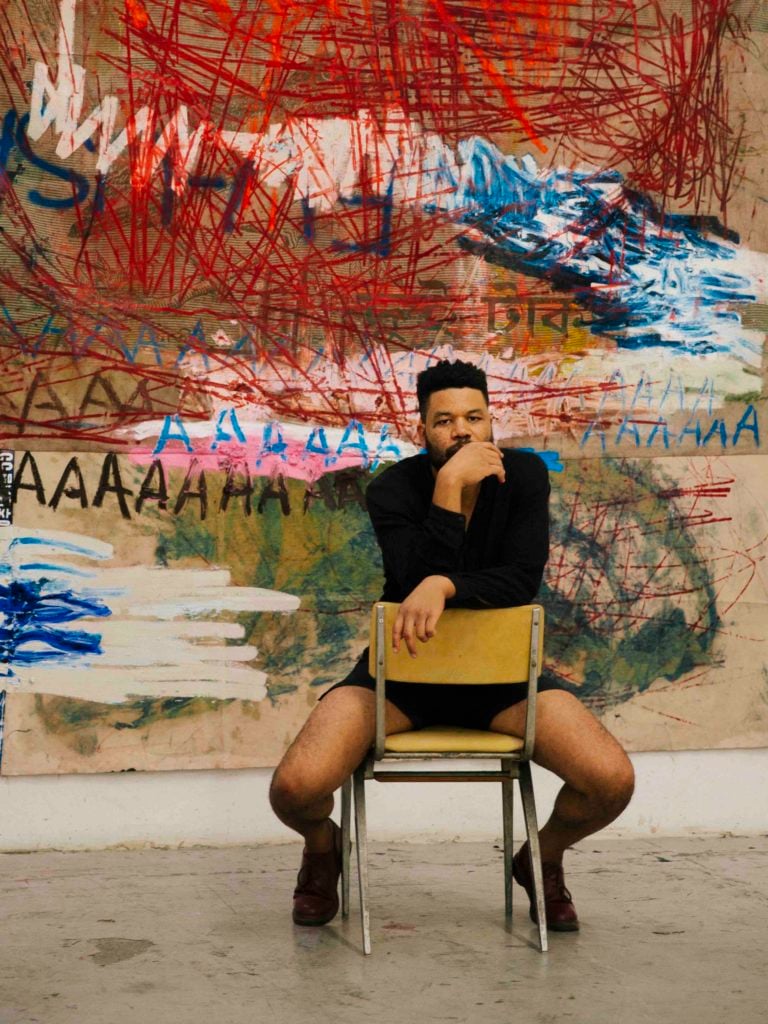Oscar Murillo has been busy. Collectors were circling like vultures at the Colombia-born, British artist’s show of new works at David Zwirner gallery in London last week, and the in-demand artist—who was recently shortlisted for the Turner Prize—also had a simultaneous exhibition at Kettle’s Yard Cambridge. A third show at the Shed in New York was due to open shortly.
At Zwirner, Murillo debuted three new series of paintings, and his most recent body of work, manifestation (which means “protest” in several languages), is a series of violent, angry paintings. And although much of his oeuvre deals with big-picture issues such trade and globalization, the artist explained in a walk-through at the gallery that the manifestation works were made in response to his own personal anxieties.
Murillo, for example, used to be afraid of flying. But now he channels that nervous energy into an autmoatist kind of mark-making. “You enter a kind of cathartic trance where you’re not really thinking about art,” Murillo explains.

Oscar Murillo, Installation view of “Manifestation” (2019). Photo by Jack Hems. © Oscar Murillo. Courtesy the artist and David Zwirner.
In an upstairs gallery are two new works from a calmer, Monet-inspired series titled surge, in which sweeping blues wash over the topmost layer of the canvas. These undulating, dreamlike works are a dry run of some of what will be included at the Turner Prize exhibition when it opens in Margate in September, he says.
But the most interesting part of the show is at the back of the gallery, where Murillo installed a seated arena that recalled his 2014 Zwirner show in New York, “The Mercantile Novel,” for which he created a small-scale, fully operational version of the Colombian candy factory that, for better or for worse, transformed his hometown of La Paila. But the new work also references Hans Haacke’s 1982 artist’s book, The Chocolate Master, for which he documented the problematic business dealings of Peter Ludwig, an art-world patron who built his empire on tax breaks and sketchy migrant labor practices.
The subject of Murillo’s work—the sources of museum funding—is highly relevant, especially as one of the sponsors of the Turner Prize has recently been the target of activists. Nor is Murillo a stranger to other sorts of controversy: this month, he spoke out against Tate Britain’s long-overdue Frank Bowling retrospective, saying the show was simply “not good enough.”
In a noisy corner of the London gallery, we caught up with the artist about some of the biggest issues of the day.

Oscar Murillo, Installation view of “Manifestation” (2019). Photo by Jack Hems. © Oscar Murillo. Courtesy the artist and David Zwirner.
On problematic art patronage and the Sacklers…
“It’s complicated. Of course [my opinion on the Sacklers] is a negative one. But to allude to ‘The Mercantile Novel,’ how do you grapple with that? You have a family that is very powerful, and they were able to create a community from scratch. But they exploited [workers] because they were extracting capital from the land, and from the people. So it just becomes a very tough one. And I think when you find yourself in a certain position of privilege, it is really difficult to see in these different dimensions. One simply sees the negative. So when you ask me about the Sacklers, of course it is a complicated one.
“I think it’s not even about patronage. I think it is a question about capitalism. Ultimately, I think capitalism is something that we are a part of even if we want to be critical of it.”
“Being critical towards a patron or an institution—which is not to say that one cannot be vocal—is simply a surface exercise that doesn’t really penetrate to the core. I think there are much more difficult examples. In the context of capital, you can begin with the Medicis, for example, in the Renaissance. I mean, here we have a powerful family. But then how did they become powerful? You can talk about it in the context of Marx. There has to be a loser. When there’s a winner, there has to be a loser.”
On artificial intelligence…
“Artificial intelligence is old. It’s not new. You can talk about artificial intelligence in the context of the Industrial Revolution: we shifted from working with animals and the land, to machines, the steam engine, factories, and the car industry. It’s just that now, [technology] has moved on to a new, much more accelerated, much more complex, more efficient [path] that is much more integrated.
[I won’t consider using artificial intelligence in my practice] because I think at the core of it, I’m interested in my own mark and my own mortality. I want to die with it.”

Oscar Murillo, Installation view of “Manifestation” (2019). Photo by Jack Hems. © Oscar Murillo. Courtesy the artist and David Zwirner.
On his Turner Prize nomination…
“I don’t know yet [how I feel about my nomination]. I’ll let you know. It’s obviously exciting that a certain level of commitment on my part has been recognized, but I just think we have to get on with it.”
On Frank Bowling…
“I think [the wave of recontextualization of historically overlooked artists] is good. But at the same time, it requires a lot of effort. I think the core of my comment [about Bowling] was just simply me feeling that it was not thorough enough for an artist who has been making work for such a long time with such complexity. You know? I thought that, even if you didn’t have the physical [exhibition] space, that perhaps the programming around [the show] would be more complex and much more, I guess, academic, in a way. I don’t know. I was hoping for more.”
On Brexit…
“I don’t want to get too [political]. But I go to Europe a lot, and I usually do it from London City Airport. Coming back, particularly on a clear day, as you leave the continent, you can already see Britain, where the land begins. It’s actually a very beautiful and poetic moment. Because of course, then you become aware of the proximity. When the plane is already beginning to descend, it is a moment that makes you think about the—again I don’t want to say ‘for’ or ‘against—but I think it’s a moment that is embedded in the complication of history. It manifests itself, geographically speaking.”
“Oscar Murillo: Manifestation” runs through July 26 at David Zwirner London.
“Oscar Murillo: Violent Amnesia” runs through June 23 at Kettle’s Yard, Cambridge.
“Tony Cokes and Oscar Muriilo: Collision/Coalition” will run June 19 through August 25 at the Shed, New York.










